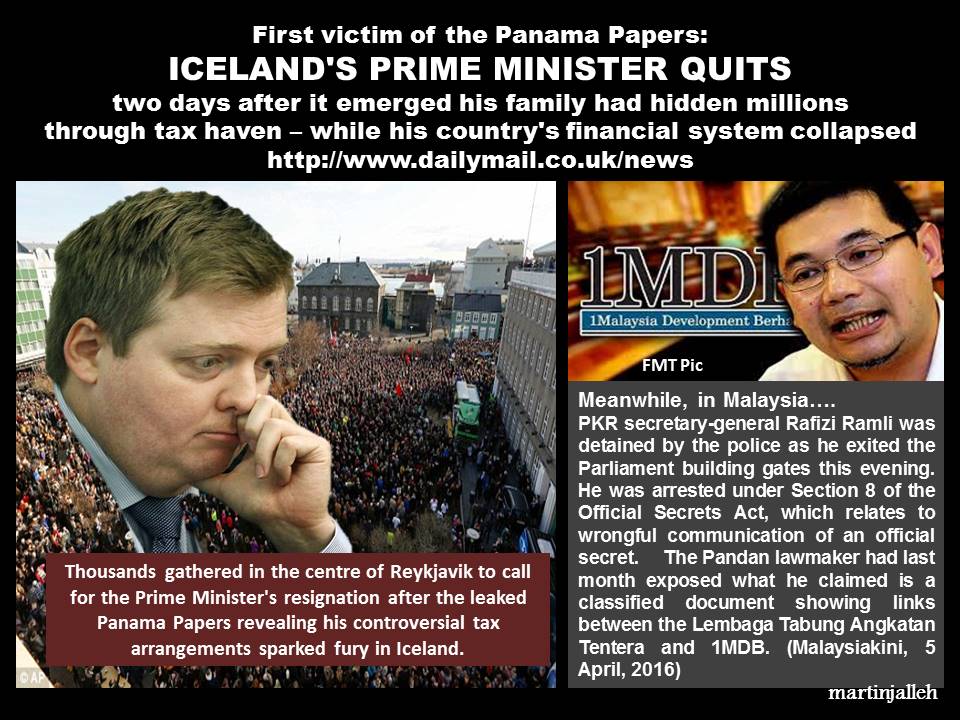By Martin Jalleh


for Malaysia
By Martin Jalleh

The Higher Education Minister, Datuk Seri Idris Jusoh today gave an example of the Ministers’ failure of leadership and lack of moral courage which is why the Malaysian government has lost its moral compass and Malaysia lost its way in the sixth decade of nationhood.
In answering the question by the PKR MP for Penampang Darell Leiking, Idris defended the two forums against Christianisation held by Universiti Teknologi Mara (UiTM), claiming that they were meant to explain the threat of Islamic State (IS) and Syiah teachings. Continue reading “Ministers’ failure of leadership and lack of moral courage which is why the Malaysian government has lost its moral compass and Malaysia lost its way in the sixth decade of nationhood”
by NICOLE KOBIE
Wired
05 APRIL 16
It’s past three in the morning, and our cab driver is lost – not only had he never heard of the city of Cyberjaya, but he also couldn’t find our hotel at its centre, the wonderfully named Cyberview Lodge Resort, built twenty years ago when ground was first struck at this would-be Malaysian Silicon Valley.
As we swung around yet another empty roundabout in the middle of the jungle, naked of any buildings or road signs, it was hard to fault the driver.
Ask government officials and developers, and Cyberjaya is a success, the heart of its knowledge-based economy: 85,000 people live there, they say, and dozens of multinationals have offices – and in a few years the train lines will reach out here, too. But ask a taxi driver in capital city Kuala Lumpur, only thirty minutes’ drive away, and they haven’t a clue what you’re on about.
Even those embedded in the tech industry might not be aware of Malaysia’s early attempt to jump on the digital bandwagon; I first heard of it via a now obscure story by Canadian journalist Chris Turner, who visited Cyberjaya in 2000, three years after its press launch. Continue reading “Inside Cyberjaya, Malaysia’s failed Silicon Valley”
The Inspector-General of Police Tan Sri Khalid Abu Bakar should be jailed by Parliament for contempt of Parliament if obstructs the PKR Secretary-General and MP for Pandan Rafizi Ramli from attending the last two sittings of the current parliamentary meeting, i.e. today and tomorrow.
This is because Khalid would have violated the unanimous resolution passed by Parliament at the beginning of the current parliamentary meeting instructing the Inspector-General of Police to ensure that there is no obstruction for MPs to make their way to and from Parliament.
Now we have the IGP himself obstructing an MP from attending the last two sittings of Parliament with the “ambush” and arrest of Rafizi outside the gates of Parliament yesterday.
If Rafizi is not allowed the liberty to attend today and tomorrow’s Parliamentary sitting, a motion should be passed unanimously by Parliament today citing the Inspector-General of Police for contempt and putting him in jail until he purges the parliamentary contempt.
This is not a partisan issue, affecting the MP from PKR or Pakatan Harapan but an issue affecting parliamentary privileges of all MPs, regardless of political party. Continue reading “IGP should be jailed by Parliament for contempt if he violates the unanimous resolution of Parliament and obstructs Rafizi from attending last two sittings of Parliament today and tomorrow”
by Liam Stack
New York Times
APRIL 4, 2016
A group of global news organizations published articles this week based on a trove of leaked confidential documents from a law firm in Panama. They exposed how some of the world’s most powerful people were said to have used offshore bank accounts to conceal their wealth or avoid taxes.
The documents, known as the “Panama Papers,” named international politicians, business leaders and celebrities in a web of unseemly financial transactions, according to the articles, and raised questions about corruption in the global financial system. Many of the figures named in the leak have denied in the strongest terms that they had broken any laws.
This explainer has been tracking significant developments resulting from the disclosures. Among them:
• The prime minister of Iceland, Sigmundur David Gunnlaugsson, resigned Tuesday.
• Gonzalo Delaveau Swett, the president of Transparency Chile, a branch of a global anti-corruption group, stepped down on Monday. Continue reading “The Panama Papers: Here’s What We Know”
by Nicola Clark
New York Times
APRIL 5, 2016
PARIS — The leak of millions of private financial documents linking scores of the world’s rich and powerful to a secretive Panamanian law firm peddling in shell companies and offshore bank accounts began more than a year ago with a cryptic message to a German newspaper from an anonymous whistle-blower.
“Hello, this is John Doe,” the source wrote to the Süddeutsche Zeitung, a Munich-based newspaper that had worked on several investigations into tax evasion and money-laundering scandals. “Interested in data?”
“We’re very interested,” replied Bastian Obermayer, a veteran of several investigations into financial scandals. Continue reading “How a Cryptic Message, ‘Interested in Data?,’ Led to the Panama Papers”